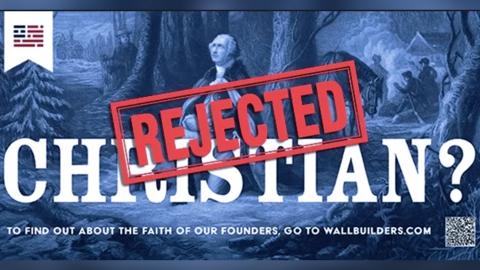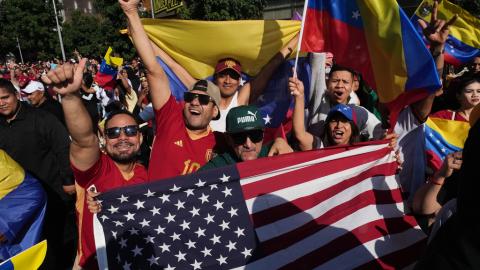
'Targeted': WallBuilders Sues After Christian Bus Ad Featuring George Washington Is Rejected
A Christian group focused on highlighting America’s Judeo-Christian history is suing the Washington Metropolitan Area Transit Authority (WMATA) over the claim its bus ads were rejected for religious reasons, a lawsuit that has attracted support from an unlikely ally: the American Civil Liberties Union (ACLU).
Listen to them on the latest episode of “Quick Start."
Tim Barton, president of WallBuilders, told CBN Digital his organization clashed with WMATA when the transit authority reportedly rejected his ads focused on the “truth of America’s history.”
“There’s not many places you can get more American history than Washington, D. C. when you have the Smithsonian, you have the Library of Congress, you have the National Archives, [and], of course, the Capitol Building,” Barton said.
He continued, “There’s so much history there, and we thought, ‘We would love to be able to advertise in a place where people, school groups … Americans from all over the United States are going to learn, and experience … some of American history.”
With WallBuilders premiering a new website, he and his team thought it was the perfect time to take out some bus ads, but were stunned when the ads were rejected.
“We worked with an agency in D.C.,” Barton said. “We chose two pretty iconic images. We chose George Washington kneeling in the snow praying … [and], also, we picked the painting of the Founding Fathers of the Constitutional Convention, where, again, George Washington, very prominent, he’s the president of that convention.”
WallBuilders then superimposed the word “Christian” with a question mark at the end of it, including a QR code that would link people to the WallBuilders website to learn more.
The goal, he said, was to address whether the Founding Fathers were Christians, noting the link would take people to a page allowing the Founding Fathers to “speak for themselves.”
But Barton said this didn’t go over well. Watch him explain:
“We got word back to the ad agency that … WMATA … came back and said that the ad was not acceptable, that it didn’t kind of pass their code and their standard,” he said.
At that point, WallBuilders reached out to First Liberty Institute, a free speech and First Amendment legal watchdog, to get advice, noting the WMATA purportedly had policies against anything controversial, political, or religious.
“It was a very subjective, arbitrary standard,” Barton said, adding his belief WallBuilders was targeted over its general beliefs. “One of the things that First Liberty advised us to do is maybe just take off the word ‘Christian’ and see if they’d be willing to run just the picture of George Washington, just the picture from the Constitutional Convention with a little QR code of the website.”
Again, the ad agency reportedly came back and said the ad was unacceptable and in violation of the WMATA’s standards.
“At this point, this is when we had to have First Liberty step in and really help us,” Barton said. “We were targeted.”
In a recently filed complaint, WallBuilders asked the United States District Court for the District of Columbia to find the transit authority’s restrictions on content that centers on “varying opinions” or that tends to “promote or oppose any religion, religious practice, or belief” unconstitutional.
Jeremy Dys, an attorney for First Liberty Institute, told CBN Digital this issue has long been a problem in Washington D.C., with the unsettled matter resulting, in part, from divergent court rulings.
“There’s a circuit split on this very issue, meaning that various courts throughout the country have taken different opinions on what is allowed and not allowed [on] guidelines,” he said, noting agencies often govern their own policies.
The problem, according to Dys, is that the standards aren’t always applied equally. While WallBuilders was purportedly denied, other advertisements for contraceptives, gambling, alcohol, the Book of Mormon production, and other themes might not face the same scrutiny.
Beyond that, though, Dys said there’s also a guideline he finds particularly problematic: the idea that nothing religious can be advertised.
“We [think] that is unconstitutional on its face and have challenged that provision as well,” Dys said. “So, we fully expect this case to go up at least above the district court to the circuit court of D. C. and potentially have to have the justices of the Supreme Court weigh in on this, again, because there’s no certainty around the country and all these metropolitan areas have various provisions.”
Barton said he and WallBuilders decided to challenge the denial in an effort to defend freedom of religious expression.
“At some point, you have to have the courage to stand up and say, ‘No’ when somebody is wrong,” Barton said. “And, especially, when it comes to constitutionality. As we spend so much time studying history, we recognize the only thing necessary for evil to triumph is good men to do nothing.”
As for the ACLU’s involvement in the case — a surprise to those who know the ideological differences between groups like WallBuilders and the ACLU — both Dys and Barton expressed gratitude that the parties are in alignment on this case.
“I think from their perspective, they see this as a pure speech issue like we do as well,” Dys said. “And that you should not be giving the government this unbridled authority to be able to choose who can and cannot speak in public forums or anywhere else for that matter.”
Find out more about the case by watching the full interview here.
***As the number of voices facing big-tech censorship continues to grow, please sign up for Faithwire’s daily newsletter and download the CBN News app, to stay up-to-date with the latest news from a distinctly Christian perspective.***



